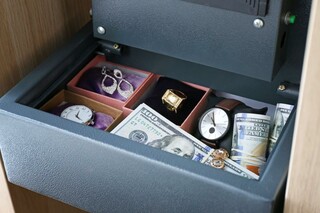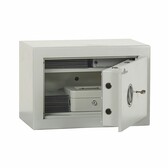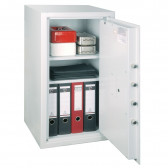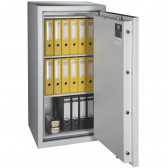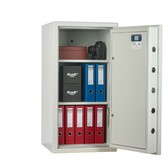If you want to ensure security and responsibly store valuables, jewelry or important documents at home, then this article is for you. Home safes are a vast and little-talked-about category, in which you will find a wide range of devices with varying features and characteristics. Let's take a look together at the basic information that will help you decide which model to choose.
What are home safes used for?
The simplest answer is the best: to secure what is valuable to you, and what kind of safe it will be – you have to decide for yourself, customizing it to your own needs. As mentioned above, you will most often store cash, jewelry, car keys and documents in it, in a word, what everyone has more or less. The higher the value (not necessarily financial, but also sentimental) of these items, the more serious the home safe should be, and the security class confirmed by certificates – higher.
What size of home safe to choose?
From a security point of view, the larger the safe, the heavier it is, and therefore the more difficult it is to pull it from the floor and carry away. Small home safes are relatively easy to carry away, and a safe that a burglar manages to take is already lost. Larger models are also more forward-looking over time than small home safes, as you will store more and more in there over the years of use, especially documents, although we wish from the heart that you had a lot of cash as well.
Can fireproof safes be installed at home?
Yes, indeed! There is definitely a higher probability of a fire than a burglary. Therefore, if you will store documents and cash in the safe – it is worth considering fireproof. Be careful, however! On the Internet there are products referred to as fireproof cashboxes. Avoid them like, nomen omen, fire. Fireproof safes are devices that have passed tests according to the EN 15659 and EN 1047-1 standards recognized in Poland and Europe. Fireproof safes are as resistant to mechanical damage as burglary safes.
Which lock to choose for a home safe?
We have discussed the differences between the available locks: key, mechanical and electronic combination lock in previous texts, so today we will focus on the utility side when using a safe at home. Unless you run a home office and use the safe privately, it will mostly be accessed by more than one person, perhaps all the adults, the family. In this case, an electronic lock seems to be the best solution. Each member of the household can have their own cipher. Mechanical locks will work worse, and by far the worst idea is the key, which, passed from hand to hand, will sooner or later go missing. Operating a safe with an electronic lock is much simpler, and the only thing you need to remember is to change the batteries once every 2-3 years.
Find out the 5 facts important when changing the code on your safe.
Where to install a safe at home?
As long as you have chosen a high-end safe, the place of installation will depend mainly on your preferences. You can mount the safe in the study, in the dressing room, in an alcove under the stairs. Discreet places will work best, so that the safe is not visible at first glance. It is important that the safe is permanently mounted to the floor or wall, but remember that a load-bearing wall is best. Be sure to check that there are no pipes or wires running through the anchor point.
What to follow when buying a home safe?
In summary, there are several criteria to consider if you want to secure cash, documents or valuables. In our offer you will find various models differing in class, size, such as small safes for storing jewelry, up to cabinet safes weighing several hundred kilograms. If you have questions or concerns, we suggest you contact us. We will be happy to advise you.
Read also:
Fireproof safe – which one to choose?
A safe to be built into the wall
Which one to choose? Comparison of safes F 103-03 and D 109-08
